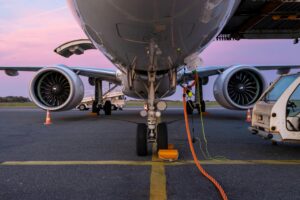Nigeria’s aviation sector sits at a critical crossroads. Despite serving Africa’s largest economy and most populous nation, the industry struggles against formidable headwinds that prevent it from reaching its full potential. A closer examination reveals a complex web of challenges—from financial constraints to infrastructure deficiencies and regulatory inconsistencies—that collectively hamper the sector’s growth and competitiveness within the regional and global aviation landscape.
The Foreign Exchange Conundrum
Access to foreign exchange stands as perhaps the most pressing challenge facing Nigerian aviation today. Airlines require dollars for nearly every aspect of their operations—from leasing and purchasing aircraft to maintaining them according to international standards. When Nigerian carriers cannot access sufficient foreign currency at reasonable rates, their very survival comes into question.
Maintenance schedules suffer particularly severe impacts from this currency challenge. Modern aircraft demand rigorous, manufacturer-specified maintenance performed at certified facilities, most located outside Nigeria. Without timely access to dollars, airlines face impossible choices: delay critical maintenance (risking safety and regulatory compliance) or ground aircraft (destroying revenue and market position).
The currency problem extends beyond maintenance. Airlines must pay international vendors in dollars for essential services and parts. Navigation charges, insurance premiums, training programs, and reservation systems all require foreign currency payments. These financial burdens make Nigerian carriers structurally uncompetitive against foreign airlines with more stable currency environments.
Infrastructure Gaps Creating Operational Barriers
The infrastructure supporting Nigerian aviation falls short in crucial areas. Many airports lack adequate lighting systems, limiting operations to daylight hours and preventing the optimal utilization of aircraft. This constraint alone significantly reduces potential flight schedules and revenue opportunities.
Fuel availability presents another critical challenge. Despite being an oil-producing nation, Nigeria struggles with consistent jet fuel supply. Shortages occur regularly, and when fuel is available, its cost often exceeds global averages. These fuel challenges create unpredictable operating environments that undermine schedule reliability and financial planning.
Navigation equipment at many Nigerian airports remains outdated or inadequate. This deficiency impacts safety margins and prevents the implementation of modern, efficient flight procedures. The resulting operational limitations further reduce competitiveness and increase costs.
Basic airport equipment shortages—from properly maintained passenger boarding bridges to baggage handling systems—create passenger experience problems and operational inefficiencies. These seemingly minor infrastructure gaps compound to create significant impacts on overall service quality and operating costs.
The Regulatory Maze
Regulatory inconsistency creates perhaps the most frustrating challenge for aviation stakeholders. Policy changes often occur without adequate industry consultation or transition periods. Airlines and investors struggle to develop long-term strategies in this unpredictable environment.
The requirement for airlines to operate domestic routes before expanding internationally, while potentially well-intentioned, often prevents carriers from accessing more profitable international markets that could strengthen their financial foundations. This sequencing requirement needs reconsideration within a broader aviation development strategy.
Aircraft age and type restrictions present another regulatory challenge. While safety concerns justify some limitations, overly restrictive policies can prevent airlines from accessing appropriate aircraft for their specific markets. Single-engine aircraft restrictions, for instance, limit the development of regional services to smaller markets that cannot support larger aircraft operations.
Airport concessions and management models warrant careful review. Current approaches have delivered mixed results at best, with many facilities failing to meet international standards despite significant investment. The governance structures of aviation agencies and airport authorities need reform to ensure professional management, transparency, and accountability.
Human Capital Deficits
Nigeria faces a growing shortage of experienced aviation professionals. Pilots, engineers, air traffic controllers, and other technical specialists require extensive training and experience. The country struggles to train and retain these professionals, particularly as global demand for their skills creates attractive opportunities abroad.
Capacity building programs exist but lack sufficient scale and consistency. Technical training facilities need modernization and expansion to meet industry requirements. Without addressing these human capital challenges, operational and safety standards will suffer regardless of physical infrastructure improvements.
Toward Sustainable Solutions
The introduction of sustainable aviation fuel represents both a challenge and opportunity for Nigerian aviation. While global aviation moves toward reduced carbon footprints, Nigeria risks falling behind without appropriate investments in sustainable fuel production and distribution infrastructure. This emerging requirement could either become another competitive disadvantage or an opportunity for innovation.
Surface accessibility to airports remains problematic across Nigeria. Poor road connections and limited public transportation options increase the total travel time and cost for passengers. These access challenges effectively shrink the catchment areas for airports, reducing potential passenger numbers and economic viability.
The financial structures supporting Nigerian aviation need comprehensive review. Current models for capital requirements, particularly for new entrants, may inadvertently encourage undercapitalization and subsequent operational compromises. Regulatory oversight must balance encouraging market entry against ensuring operators possess sufficient resources for safe, sustainable operations.
The Path Forward
Addressing these challenges demands a coordinated, strategic approach. Piecemeal solutions addressing individual problems will likely fail without tackling the interconnected nature of these issues. Nigeria needs a comprehensive aviation development strategy with realistic implementation timelines and measurable outcomes.
Priority should go to creating a stable regulatory environment that enables long-term planning and investment. The customs duties and charges affecting aviation warrant immediate review to eliminate unnecessary burdens that undermine competitiveness. Foreign exchange access mechanisms specifically designed for essential aviation services could protect basic operational capabilities during broader economic challenges.
Infrastructure investments need careful prioritization, focusing first on safety-critical systems like airfield lighting and navigation equipment. Public-private partnerships offer potential solutions for larger infrastructure gaps, provided they incorporate appropriate governance mechanisms and performance metrics.
Nigerian aviation stands at a pivotal moment. With Africa’s aviation market projected for significant growth over the coming decades, the country can either position itself as a regional leader or watch as traffic and economic benefits flow to better-prepared neighbors. The challenges are substantial but not insurmountable. What remains to be seen is whether the political will exists to implement the necessary reforms before more opportunities slip away.
Disclaimer: The insights shared in this article are for information purposes only and do not constitute strategic advice. Aviation markets and circumstances vary, and decisions should be based on your organisation’s specific context. For tailored consultancy and guidance, please contact info@avaerocapital.com.




